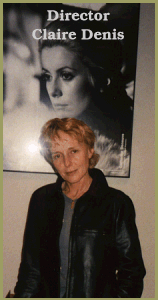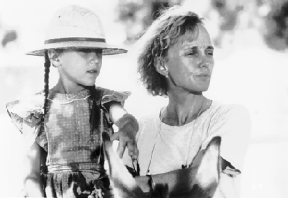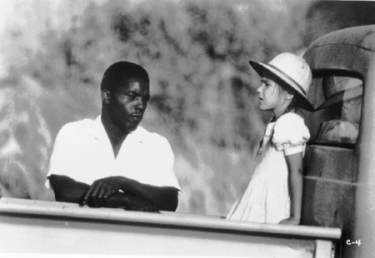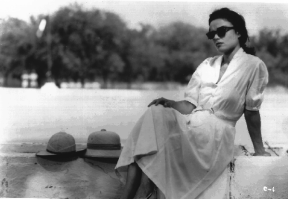
Claire Denis has such a unique voice as a director that it seems amazing to me that she isn't more recognized for her work. I first was jazzed to her work when I saw "Chocolat" at the Greenway 3 back in 1988-89. The film still remains one of my favorite films but sadly her later films passed Houston by until recently when the MFA was smart enough to showcase a small selection of her films to dismally small audiences. (Of course, keep in mind I'm the guy who raced to the Buckminster Fuller/Frank L. Wright documentary thinking good seats would go fast...so my idea of a big event seems to be a bit off.)
Amy Taubin of Village Voice calls Denis "one of the great directors of our time" and I'm inclined to agree. Denis has one the most unique, vicious, and sharp-edged view of the world around her and watching her films leave one affected long after the viewing. In the course of the last nights screening at the MFA, I was able to squeeze about ten exasperating minutes for this interview. I mean really you try to do an interview with someone behind the subject pointing at their watch. Anyhow, I hope this is of some interest to you cats.
R: A surgeon cures people and a baker feeds people. What do you do as a director? What is your function?

CD: If I would be something else I would prefer to be a baker more than a doctor, actually.. It's more my range... to bake for people than to cure people. But to be a good baker you have to think twice. I'm not sure if I'm a good baker but it's more what I would do.
I don't think films are meant to cure people from anything. Film making is ... you do it not apart from the people... you do it in a crowd. I think the [better] you feel the crowd around, the better you can make films.
R: The crowd being...
CD: The other people...my life...When I walk on the street, when I take the metro, a bus, or when I'm driving. Film making is to me very similar to being in a cafe somewhere in Paris and looking at the people walking by, sitting next to me and thinking about me and the people. That's being one of them, not being the doctor. I think it would be very vain for me to pretend that film can cure people. A film can just be a wave...just shaking hands something very friendly you know.
R: Under some drugs you lose a sense of time which is very unique and offsetting and with :"Chocolat" there is a similar sensation in which time becomes elastic and fluid as well. The feeling of the setting and the time are very unique in that movie. These movies are unique experiences and I think there is something in terms of affecting people....a kind of philosophy......
CD: But it's not a philosophy in film it's something that I experience and maybe I don't know how to do otherwise. The thing is I know that film is..... there is probably necessity of a plot.....and for some strange reason even if I work on a script and I try to make a plot....because I'm told I have to have a plot... something comes up and it's time.

R: But do you really need a plot? In "I Can't Sleep", it seemed that there was a plot but it seemed like the plot was almost unnecessary.
CD: No it's not really unnecessary...that is what always happens with me...I have a vague idea of a plot and then it seems so unnecessary when I'm really starting working you know. That the only thing that happen with me is that when I start working is that time becomes like solid - like something I know.. although it's not at all philosophical. Something happens while shooting that makes time important. In this peculiar time even when I'm editing I'm not trying to change. I know it's not at all like air . It's something solid. Time is something that affects you. I think I like....I don't mean I'm giving lessons but I think it has...something happens in between scenes and inside scenes that is time...and space but space everybody knows about it...it's the angle of the camera...but the time is something you are not sure of and it's there.
R: When I saw "I Can't Sleep" the first time I didn't really enjoy it. But watching it a second time what made it work for me was the small details that weave everything together. You put a lot of weight on very subtle and small movements and if you miss that little thing you miss quite a bit. In "No Fear No Die" the way he moves with the roosters is very beautiful and says so much about the character.
 CD: Well, you are speaking about time when you speak about the training scene of the rooster. It's something.. on paper I would have think that it is a matter of seconds or very short scenes but when I watch the real training of a rooster I find it is a question of time. You spend hours and weeks to train a cock...a rooster for a fight that will last two minutes. So I think that it was important to show the difference of time between a fight an actual fight which sometimes will last a minute and the training which is long and necessary like an athlete training. I think this is very interesting for me as a filmmaker- this aspect of time.
CD: Well, you are speaking about time when you speak about the training scene of the rooster. It's something.. on paper I would have think that it is a matter of seconds or very short scenes but when I watch the real training of a rooster I find it is a question of time. You spend hours and weeks to train a cock...a rooster for a fight that will last two minutes. So I think that it was important to show the difference of time between a fight an actual fight which sometimes will last a minute and the training which is long and necessary like an athlete training. I think this is very interesting for me as a filmmaker- this aspect of time.
R: One thing I wanted to ask you. Abdullah Ibrahim. You did a lot a work with him. How did you meet him?
CD: I met him long ago before I was directing films in clubs in Paris. Then [when] I wrote Chocolat I tried to contact him and was very surprised that he responded yes and he wanted to read the script. We did two films together...now I don't see him that often now [that] he lives in South Africa.
R: How closely do you work with the music?
CD: Very close. I mean I think Abdullah was the only one who understood "Chocolat" on the spot when he read the script . He was my best companion - he knew everything about the film. I knew that because of his music. I knew he knew exactly what it was about. So I was totally confident.
R: I kind of want to ask you, going back to the original question, what is the role and value of cinema and what you do?
CD: This I have no idea really. Cinema for me? I need to see films.
R: But why do you go through all the work, time and effort to make statements to people?
CD: Because I think it's a very interesting way to be like to be fond of other people I think cinema is sharing and I think that's what interests me.
R: So you're having coffee with your audience.
CD: I think that is a good definition.
Films
Rated on a five bong scale.
Chocolat (1988)
One of my all time favorites. Denis recalls her childhood in Africa as a long tone poem. Great cinematography. I know she'll hate this but man this is a great stoner movie. (5 Bongs)
Two guys set about training cocks for illegal fights. Denis focuses on the paradoxical training and the cruelty of the fights. A tragic love story also figures in here. No animals were hurt in the making.(5 Bongs)
Arguably her weakest film. The film is pushed as the story of the imfamous granny killer of Paris. The thing is she really doesn't seem to get into that character and instead places emphasis on two other characters: a Lithuanian actress who emigrates to France and the killer's brother who wishes to return to his homeland. This is not to say it's a bad film but that the sidebar is actually the focus and the center of the film is just a cul-de-sac. Some great moments and still worth your time. (3 Bongs)
Denis returns to form with this story of a brother and a sister who have to deal with her pregnancy. Denis plays with the line of dreams and reality (with great results and an ending segment that depending on how you see it can be considered brilliant or a muddled narrative). Hey, interesting enough there's actually a thing called character arc which you sometimes tend to forget exists these days. (4 Bongs)
Highly recommended
Back der Worship Guitars Homepage
Send threatening mail to us here at:
rmedina@worshipguitars.org